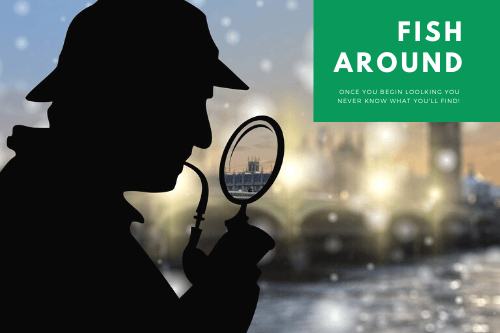
YouTube / iTunes / Spotify / Radio Public / Pocket Casts / Google Podcasts / Breaker / Overcast
Listen to ArtisanEnglish.jp posts & lesson intros here.
Word of the Day: Fish around
Seafood is a significant part of Japanese cuisine.
I mean, vegetarian sashimi is just not the same as the real thing.
Of course, to catch sea creatures, you have to go fishing.
It doesn’t matter if you’re looking for crabs, lobsters, whales or shellfish.
We can still call it fishing.
This is where things become complicated.
Did you know that if you’re looking for something in your backpack or trying to get the lowdown on the latest scandal, you are also fishing?
Yep, English is complicated that way.
Just when you think you know everything about a word, there is something else.
You can fish around in your handbag for your favourite lip chap, the air is just so dry in winter, or you can fish around the office for compliments after presenting the findings of your recent study into the lifecycle of a ¥1,000 note.
Whenever you actively dig or search for something, you fish around for it.
As you may know, I live in the countryside, and people here are always fishing around for information.
If there’s a different car in the parking lot or the living room lights are on earlier than usual, someone notices and mentions it.
Of course, they would never ask directly.
They mention it briefly or hint that something was unusual.
That’s how it goes when the lovely old ladies want information; they fish around for it.
There’s nothing as well-known in the countryside as everyone else’s business.
I, myself, never fish around for information.
I eavesdrop when my wife is on the phone.
Flesch-Kincaid Readability Test
This post is understandable by someone with at least an 8th-grade education (age 13 – 14).
On the Flesch-Kincaid reading-ease test, this post scores 70.
The higher the score on a scale of 0 – 100, the easier the passage is to read.

